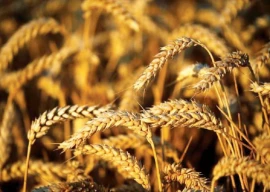
About 58% of Pakistanis are food insecure, according to the findings of the National Nutritional Survey (NNS) 2011.
This situation has deteriorated from the previous nutritional survey published in 2003 which marked food insecure Pakistanis at 50%. “The situation has gone from bad to worse especially in Sindh where malnutrition and food insecurity among women and children has increased,” said a spokesperson for the World Food Programme (WFP), Amjad Jamal.
“Nutrition is not only a health issue but a socio-economic one as well,” said Dr Muhammad Dauod Altaf, the provincial head for the World Health Organisation emergency assistance programme. Altaf was speaking at a seminar organised to launch the survey on Tuesday. “There are many underlying factors which are crippling [Pakistani] society as a whole. But the job is not for the health department alone. The departments of agriculture and education also need to work together so the issue of nutrition can be addressed.”
The problem is not that Pakistan doesn’t have food to feed its people but that people do not have purchasing power with the rise in food and other prices, Jamal explained.
Speaking to The Express Tribune on the sidelines of the launch, the chief of the Nutrition Programme at the Unicef headquarters in New York, Dr Werner Schultink, elaborated on the issue. “According to survey data in 2001, Pakistan was among the top 20 countries with chronic under nutrition,” he said. “In the last 10 years many, including Ethiopia, Nepal and Rwanda, have improved their situation but Pakistan stays about the same...with a slight tendency of going upward. That is worrying.”
There is some good news though. Schultink says many people have been identified with acute malnutrition. “The good news is acute malnutrition is treatable and Pakistan’s capacity in this area has sky rocketed.” In the last three months of the previous year, ie, immediately after the floods, Schultink says, more children were treated for acute malnutrition in Sindh than all over Pakistan.
There is still the issue of chronic malnutrition. “Expecting mothers and young children require certain nutrients every day,” he said. “When they fail to receive this it will impact not only school performance but put them at risk for diabetes and cardiovascular diseases.”
“Pakistan will lose an entire generation to malnutrition,” said Unicef’s chief field officer Andro Shilakadze. “Children will not receive an education not because there are no schools to attend but because children are low on iodine. If we don’t emphasise and galvanise on this issue [malnutrition] now we will betray our children!”
Unlike Unicef which attends to the severely malnourished, WFP caters to those who are moderately malnourished. Chief provincial officer for WFP, Dorte Jessen, said, “We need to hit the root and fix the symptoms and it’s good that everyone is willing to do that now.”
There are some contributing factors to consider though. First is a global recession followed by recurring emergencies in the country in the shape of natural disasters and unhygienic living conditions. “The world has been hit with a financial crisis, raising the prices of fuel and thus food without wages matching the increase,” WFP’s Jamal said. The floods of 2010 and heavy rains of 2011 compounded the issue. Bad health is also a result of unsanitary conditions many people live, eat and sleep in. “One more issue is the unequal distribution of food across provinces.” For example, Punjab has excess food and sends some to Balochistan but the high fuel costs in transport result in high food prices which reduce affordability.
Published in The Express Tribune, January 11th, 2012.
COMMENTS (5)
Comments are moderated and generally will be posted if they are on-topic and not abusive.
For more information, please see our Comments FAQ























1714024018-0/ModiLara-(1)1714024018-0-270x192.webp)















If that same 58% are voters you can kiss the current govt goodbye.
and how much is the defense budget again?
In Pakistan problem is distribution of Food. in many areas we have sufficent food and we waste them. Heirarcy of status is the foundation of this problem. some persons have sufficent things to waste but other have not basic needs. we wastes money on useless activities
Certainly sad to hear that. Don't know what to say except that may be going for expensive nuclear arms was a really bad miscalculation by us...we could have opted for food and books instead.
When you don't educate a generation, you don't provide them a way to feed themselves.